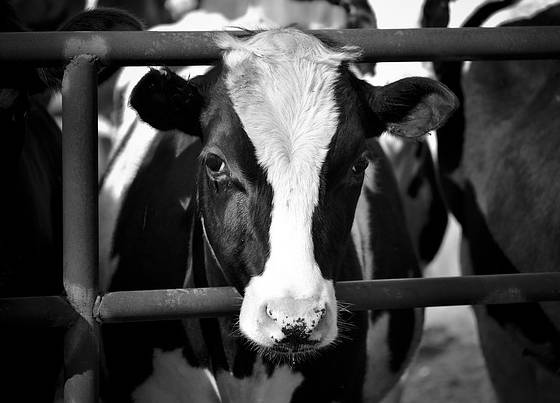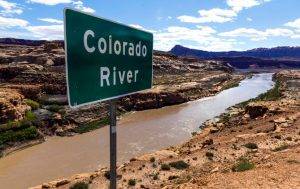
Arizona’s farmers are on the job during COVID-19 keeping the nation fed. But disruptions, from erratic shifts in consumer spending to Mexico canceling imports, are causing financial distress in certain sectors.
Sudden changes in consumer buying are hurting food supply chains, particularly for meat and dairy producers, said Stefanie Smallhouse, CEO and president of the Arizona Farm Bureau, which is the voice of the $23.3 billion industry.
“The supply is certainly not a problem for the consumer right now, but the demand behaviors have shifted to the extent that it’s wreaking havoc on normal supply chain operations and commodity prices for the producer,” Smallhouse said. “The food system is incredibly complex and so there are bound to be issues during a crisis such as this.
“While a very small number of farm-to-plate growers might be seeing a spike in demand and price, they face problems actually getting the product to the consumer.”
National dilemma for farmers and ranchers
Arizona is not alone. A cloud is looming over the industry during the nation’s shutdown.
Price forecasts for most agricultural products are bleak, according to the American Farm Bureau Federation. In the past month, dairy prices have dropped 26 to 36 percent, cotton futures have plummeted 31 percent, hog futures are down by 31 percent and on and on.
“Farmers were already facing record losses before the COVID 19 pandemic hit, and so this is quite a punch in the gut for those who were depending upon the China trade deal to kick in back in February and uninterrupted trade with Canada and Mexico for products such as dairy and beef,” Smallhouse said.
Industry, state and government officials are pulling together strategies to help
Shoppers can help by returning to favorite foods
Supply chains have been disrupted for a number of reasons including grocery shoppers rushing to stock up non-perishable supplies.
“For example, fresh produce is available, but demand has gone down as families shift to less perishable products, like soup,” said Julie Murphree, outreach director for the Arizona Farm Bureau. “We stormed in and purchased our bulk supplies of toilet paper and canned goods.”
Now, shoppers can help by returning to their usual food choices.
“Arizona families can help support our supply chains by continuing to buy what they have historically eaten during normal circumstances,” Murphree said.
Beef and dairy producers are among the hardest hit.
Suddenly, ranchers who sell beef direct have “very limited options” to deal with increased demand with few local packing houses and a supply based upon much different consumer behaviors a month ago, CEO Smallhouse said.
As restaurants, hotels, schools and other institutions have cut back hours or closed completely, milk producers have had to dump enormous quantities of unused product.
Removing limits on dairy purchases in stores to help
While there is plenty of fluid milk being produced, limits on shoppers dairy purchases are causing supplies to spoil.
“Our cooperative of United Dairymen of Arizona ran the numbers and came to the conclusion we need to dump about a million pounds of milk a day,” said Arizona state Sen. Sine Kerr, whose family operates a dairy farm in Buckeye. “One gallon is 8.6 pounds so roughly that equates to 125,000 gallons a day that different farms are pouring out.
Her family’s dairy has not been affected yet, but “we’re waiting for the call,” she said.
“It will come and so you are literally watching the fruits of your labor going down the drain. It has a devastating effect on our farm families.”
Now, the Governor’s Office and others are calling on major chains like Kroger, Target, Walmart and CVS to lift limits on milk purchases.
Other programs are in effect or being considered as well. Sending unused product to food banks, handing out extra milk to students receiving free and reduced lunches, and the Double up Food Bucks program are a few. The latter is designed to help farmers sell produce. It allows SNAP recipients to match dollar for dollar up to $20 to purchase Arizona grown produce.
Calling on Mexico to accept imports
Arizona leaders also are calling on Mexico to lift an import ban that occurred when the country’s Ministry of Health that issues import permits, closed in late March in response to the coronavirus.
About 16 to 17 percent of Arizona milk goes to export. Of that number, 70 percent goes to Mexico, Kerr said.
Gov. Doug Ducey has sent letters to U.S. Secretary of State Mike Pompeo and Secretary of Agriculture Sonny Perdue to get the ban lifted.
Allow farm laborers from other countries to stay longer
There is fear that some of the disruptions could escalate and cause more severe damage to the agriculture industry, particularly in hiring farm labor, said Smallhouse of the Farm Bureau.
A large percentage of foreign workers from countries like Mexico arrive on temporary work permits known as H-2A visas.
“We do have concerns that if this pandemic crisis continues much further past May, we will see disruptions in the labor supply just because the H-2A program is pretty cumbersome and unworkable under normal circumstances,” Smallhouse said. “If we start seeing illness in farm workers and have overlaps in harvest work from state to state, there is going to inevitably be a slow down in the system and shortages at critical times.”
Dairy and produce are particularly laborious products to get to market. Smallhouse worries that an already insufficient labor supply will become even more strained.
“Access to legal workers is a very real challenge for most farms and ranches. The groundwork for a long term agricultural worker program has already been done, we just need bipartisan cooperation in Congress that supports realistic program guidelines that will actually work in agriculture,” she said. “Within such a program you would see workers on one farm or ranch for three years at a time, instead of months at a time.”
Bipartisan group of senators calling for financial assistance for farmers
A new federal Paycheck Protection Program and U.S. Small Business Administration loan program are now up and running to help small businesses including farmers stay afloat during the COVID-19 outbreak.
A bipartisan group of U.S. senators including Arizona Senator Martha McSally also are requesting financial assistance for struggling farmers and ranchers.
In letter to Agriculture Secretary Perdue, they are asking for emergency measures to help.
“As you know, farmers across the country have faced many challenges in the past several years,” states the letter. “The coronavirus pandemic is now causing additional disruptions, driving further declines in market conditions, prices, and export demand, and some experts believe that the consequences of the pandemic could hit rural communities particularly hard.”
To provide support for those affected, the senators are asking Perdue to consider deadline extensions, loan payment deferrals, payment forbearance, and a full suspension of all current and pending foreclosure actions effective for the duration of the pandemic and subsequent economic recovery.
Food supplies remain plentiful
Senator Kerr, meanwhile, said she wants to reassure Arizonans that while there is a health disaster, there is not a food shortage.
“I don’t want people to feel afraid that we have a food shortage,” Kerr said. “This virus event is not a food disrupting event like a hurricane, tornado or earthquake. As farmers and ranchers we will always make sure that Arizona is well fed. That’s our passion.”




